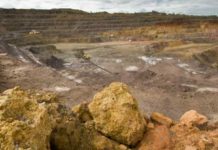
[miningmx.com] — RESOURCE nationalism was the number one issue threatening the mining industry and, in turn, threatening investment in the minerals sector in African countries.
That’s the view of mining law expert Michael Blakiston, a partner in the Australian law firm of Gilbert & Tobin.
Addressing the Africa Down Under conference being held in Perth, Australia on Friday, Blakiston said resource nationalism came in various forms, one of which was beneficiation.
“Not all minerals are capable of being beneficiated in a particular country,’ he told delegates.
He pointed out that over the last 12 months more than 25 countries worldwide had either increased or announced an intention to increase the take of the State from resource projects.
Those countries range from developed nations like Australia, the United States and Canada to developing nations like Brazil, Peru, Namibia and Sierra Leone.
Other forms of resource nationalism cited by Blakiston included: black economic empowerment; resource rent tax; new mining acts; state participation; nationalisation; amendments to royalty rates; the imposition of capital gains tax on transfers; taxation adjustments; the imposition of export taxes as well as the reservation of minerals for state exploitation.
He commented: “In many cases these penalties are imposed without consultation with the industry.’
Blakiston said resource nationalism had “shot to prominence’ over the past year. He slated politicians for viewing mining companies as “easy targets’ but he also criticised mining companies for not communicating enough with politicians.
He commented: “The attraction of the mining industry to a state is that, simplistically, the industry appears highly profitable due to the high commodity prices which are repeatedly headlined.
Blakiston pointed out that, while groups like BHP Billiton, Rio Tinto and Vale had reported extraordinary profits recently, this was the result of the investment of huge amounts of capital over extended periods to develop their mines.
“Miscommunication creates the wrong impression of the mining industry which, as a whole, has not necessarily been making super profits despite the high commodity prices,’ he said.
“The bulk of the companies at this conference are not making those kind of profits. Their projects have been negatively affected by project cost overruns; increases in operating costs; shortages of skilled labour; adverse foreign exchange movements and expensive debt and equity.
“Resource nationalism also comes on top of other demands being placed on the mining industry such as community developments; local procurement; the social licence to operate and environmental protection beyond the direct impact of the mining operation. All of these factors come at a cost.’
Blakiston highlighted various key issues that companies had to establish clarity on while negotiating contracts and agreements with governments but stressed the importance of broader engagement so that “the particular circumstances of the company are known to the State’.
“There should be engagement with politicians across ministries and with key ministerial offices. It’s surprising how many top mining company executives don’t know the phone numbers of the key politicians they need to deal with.
“When you get into trouble who are you going to call? Ghostbusters does not work in Africa.’
Blakiston also stressed the importance of creating an active chamber of mines which he said could protect the identity of individual companies in disputes if required.










